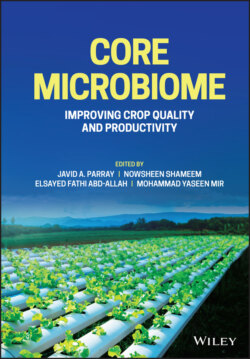Читать книгу Core Microbiome - Группа авторов - Страница 31
2.3.3 Plant Disease Management
ОглавлениеDisease management involves strategies and methods for manipulating the antagonistic populations to hinder pathogen survival and plant growth promotion. Endophytes are environmentally benign agents and thus are ideal candidates for efficiently promoting plant growth and act as bioactive candidates against parasitic nematodes. Bogner et al. (2016) showed that Fusarium solani and F. oxysporum complexes successfully reduced penetration and subsequent galling and reproduction of root-knot nematode, which can further be used for developing disease management systems in tomato [72]. In a study on activity against nematode, endophytic bacteria that belong to Bacillus spp., Streptomyces spp., and Pseudomonas spp. suppressed phytopathogenic burrowing nematode (Meloidogyne javainica) in banana roots with 70.7% biocontrol efficiency in sterile soil compared with control [73].
Furthermore, in another study, the endophytic B. subtilis strain E1 R-j was administered to determine its inhibitory effect on the causative agent of wheat stripe rust disease Puccinia striiformis [74]. In-vitro studies revealed an 84.1% inhibition rate when 10-fold dilution of fermentation liquid was used to treat bacterial cells. At the same time, in field trials, a significant decrease in disease severity was observed compared with non-treated plots. Moreover, a seven-month trial period of endophytic Burkholderia cenocepacia 869T2 against Fusarium wilt reduced the disease incidence to 3.4% compared to 24.5% of non-inoculated plants [75]. Similarly, pre-inoculation of peanut with beneficial root endophyte curbed root rot, which was evident from a decrease in the colonization by pathogens, cell death, and disease severity [76].
After a long period of continuous cropping system, a single type of root exudate can lead to an imbalance in the microbial diversity of the soil and can cause soil deterioration. In a greenhouse experiment, exudates from root endophyte Phomopsis liquidambaris improved significantly the rhizospheric abundance of bacteria. They promoted growth in peanuts by alleviating soil sickness [77]. Adopting a rational approach for disease management for sustainable agriculture has vast potential in the future. One of the benefits of using microorganisms is their role in declining agrochemicals, making agricultural practices more viable. An extensive field trial using inoculants containing an endophytic strain of Rhizobium leguminosarum bv. Trifolii enhanced grain yield in 19 tests out of 24, thus promoting rice production capacity and curtailing the necessity of chemical N-fertilizer inputs [78]. Muscodor albus, a novel endophytic isolate, is already registered and patented by Marrone Bio Innovations as a potent mycofumigating agent. Many studies have reported its potential as a biofumigant [79,84,80].
